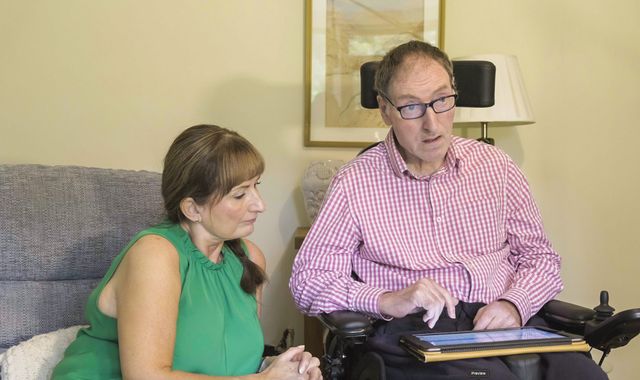Ex-teacher makes final plea for assisted dying to be legalised in UK
Written by News on 06/09/2019
A former teacher who will travel to a Swiss clinic today to end his life has recorded a video calling for politicians to legalise assisted dying.


Richard Selley, 65, from Perth in Scotland, was diagnosed with motor neurone disease four years ago.
In the recording, he says: “I have lost the ability to walk, talk and swallow. I have also lost most of the power in my arms.
“Despite these losses I have tried very hard to remain positive and my palliative care has been outstanding. However, as I enter the final stage of my journey, I don’t wish to suffer for much longer so I am seeking an assisted death with Dignitas.”
In the recording he explains how he feels “fortunate” to be able to afford the £10,000 cost of travelling overseas to take his own life when “most people cannot”, before detailing the personal effort it took to be allowed the correct paperwork to arrange his own death.
“Despite what some people think, Dignitas do not let people simply fly to Zurich, knock on their door and ask to die. I have already had to compose letters, write a life story and obtain medical records that prove that I am terminally ill,” he says.
“This has been stressful, particularly as my GP was advised to refuse my request for an up-to-date medical report.”
He also sets out how a change in law would have allowed him to spend more time with his family.
Mr Selley says: “Having to be able to fly means that I am choosing to die earlier than I would prefer. If an assisted death was possible in Scotland, I would be able to die at a time of my choosing, at home.”
He finishes the video by saying he believes there is growing momentum for laws to be changed, calling in particular on members of the Scottish parliament.
“It will be too late for me, but I hope that sometime soon people in my position will have the choice to have a peaceful death at a time of their choosing,” he adds.
Assisted dying is an area of law that sharply divides opinion. At the other end of the spectrum is the argument that any changes would put vulnerable people under increased pressure to end their lives.
Gordon Macdonald, chief executive of campaign group Care Not Killing, said Mr Selley’s case was being used to “try and justify a campaign that will rip up long held universal protections, by treating those who are terminally ill, disabled, or have chronic conditions differently in law”.
He added: “Such a change in the law will put vulnerable people at risk of abuse and of coming under pressure to end their lives prematurely.”
However, according to research carried out by the campaign group Dignity in Dying, 84% of the British public would support a change in the law to allow assisted dying as an option for terminally ill, mentally competent adults.
It estimates that 39% of the public have witnessed a dying family member or friend suffer unbearably towards the end of their life, with over half of the people they polled saying they’d consider travelling abroad for an assisted death if they were terminally ill.
Sarah Wooton, chief executive of Dignity in Dying, argues there needs to be reform.
She said: “I think in the light of the huge public support for a change in the law, in the light of the overseas progress on this issue so many countries and states in the us are looking at changing legislation, this country absolutely needs to provide universal access to palliative care and the choice of assisted dying at the end of life.”
(c) Sky News 2019: Ex-teacher makes final plea for assisted dying to be legalised in UK







